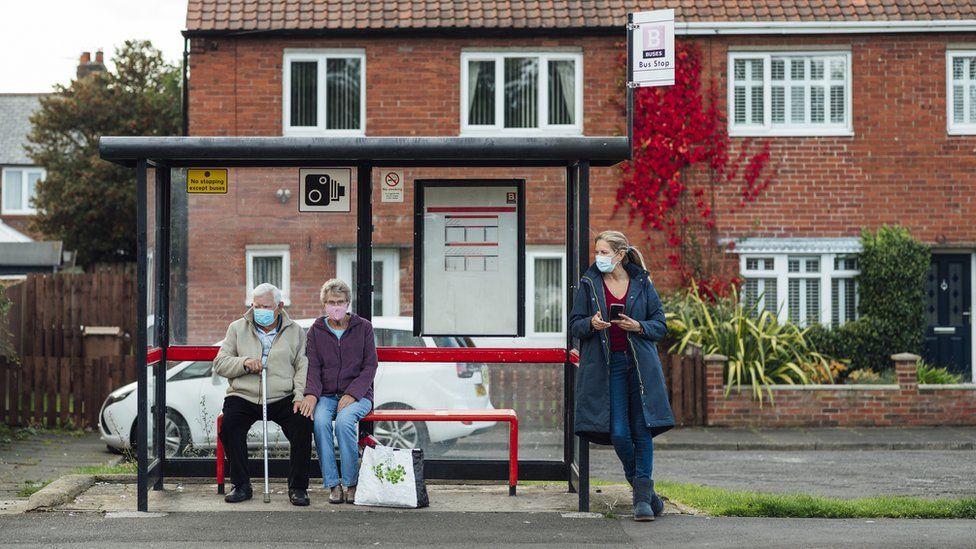Life won’t get easier until 2023, warns Bank boss
 Image source, Getty Images
Image source, Getty ImagesThe rising cost of living and squeeze on living standards will not ease until next year, the governor of the Bank of England has said.
Andrew Bailey said many people in the UK faced a "difficult period" ahead.
It comes after the Bank increased interest rates from 0.25% to 0.5% on Thursday and said that it expected prices to climb faster than pay.
Millions of households are also set to pay an extra £693 a year on energy bills from April.
This led the government to announce measures to cut energy costs for many households by £350 through a combination of rebates and council tax cuts to ease the impact of soaring bills.
Rising gas and electricity costs are the main factors pushing up prices across the economy.
However, the Resolution Foundation think tank said the government's package would not stop average incomes and living standards from falling.
It said about 640,000 of the poorest households in England would not receive the council tax cut due to them living in properties not eligible for relief.
Mike Brewer, chief economist at the Resolution Foundation, said the chancellor had announced a "bold plan", but by not targeting "families most in need of support, and by trying to minimise the cost of support to the public purse", households would still face significant bill rises and higher bills "for many years to come".
"The £350 energy bill rebates will soften the cost of living crunch this spring. But families across Britain are still set for recession-era levels of squeezed budgets this year, with the average family seeing their incomes fall by £1,000 over the course of 2022," he said.
'Difficult period ahead'
The Bank of England has forecast that post-tax incomes are forecast to fall by 2% this year, after taking into account the rising cost of living, which represents the biggest fall in living standards since records began in 1990.
Workers are currently getting pay rises of just below 5% on average, according to a Bank survey.
Mr Bailey warned that people would notice the impact of rising prices in the year ahead.
"It is going to be a difficult period ahead, I readily admit, because we are already seeing, and we're going to see, a reduction in real income," he said.
"We're going to start coming out of it in 2023, and two years from now, we expect inflation back to a more stable position."
Inflation, the rate at which prices are rising, is expected to peak at 7.25% in April, and average close to 6% in 2022.
That would be the fastest price growth since 1991 and is well above the Bank's 2% target.
"This is a world of an external prices rising, reducing people's real incomes," Mr Bailey said.
He said soaring energy costs were outside of the Bank's control, but that had "acted" to "prevent things getting worse".
"This is not a normal situation," he said. "There are forces in here, particularly things like energy prices. We can't directly alter those prices."
He suggested there were "good reasons to believe" that energy prices "will start to ease, not least because they are somewhat seasonal".
However, Mr Bailey suggested workers should not ask for big pay rises to cope with the rising cost of living, so that prices did not increase out of control.
Asked if the Bank was also implicitly asking workers not to demand big pay rises, he said: "Broadly, yes".
Mr Bailey said that while it would be "painful" for workers to accept that prices would rise faster than their wages, he added that some "moderation of wage rises" was needed to prevent inflation becoming entrenched.
Mr Bailey was paid £575,538 including pension, in the year from 1 March 2020, more than 18 times higher the median annual pay of £31,285 for full-time employees.

Are you worried about the rising cost in living? How will it affect you? Get in touch haveyoursay@bbc.co.uk.
Please include a contact number if you are willing to speak to a BBC journalist. You can also contact us in the following ways:
- WhatsApp: +44 7756 165803
- Tweet: @BBC_HaveYourSay
- Please read our terms & conditions and privacy policy
Or use this form to get in touch:



No comments